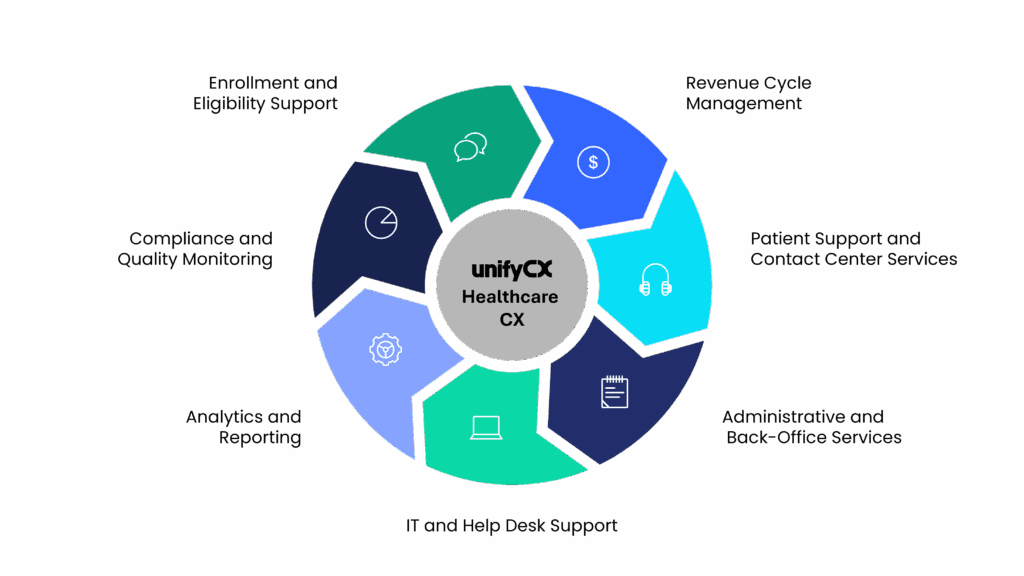The New Age of Patient Expectations
AI is quickly becoming a game-changer in patient support, helping healthcare teams deliver smarter, faster, and more personalized care. And it’s not just hype—healthcare is actually leading the charge. According to Deloitte, 40% of healthcare organizations have already adopted AI, putting the industry ahead of others like retail and manufacturing. Gartner is also predicting that by 2026, a whopping 85% of healthcare organizations will be using AI to handle things like billing and financial support.
Today’s patients are no longer passive recipients of care. They are informed, connected, and expect services that are as seamless and personalized as those offered by leading innovators. Whether it’s scheduling an appointment, getting a lab report explained, investigating a new health insurance policy, or seeking mental health support, patients demand emotionally intelligent interactions that provide accurate, empathetic responses in real time.
It's no longer a question of humans versus machines. Today, it's about what becomes possible when they work side by side.In healthcare, where empathy is just as important as efficiency, AI isn’t here to replace doctors, nurses, or support teams. It’s becoming a quiet partner, supporting staff by helping them listen more closely, respond more quickly, and care more deeply. These tools are emerging not as rigid scripts, but as thoughtful assistants that empower individuals to recognize context, understand emotion, and respect the real concerns behind every patient interaction.
What Are the New Expectations of Today’s Patients?
Today’s patients expect more than just timely care; they expect smart, seamless, and emotionally aware healthcare experiences that mirror the best of consumer brands. These new-age patients expect:
- Care and support to be not just fast, but deeply empathetic, personalized, human, and emotionally aware at every touchpoint
- Greater convenience and flexibility in accessing care, including telehealth, retail clinics, virtual visits, and extended after-hours options
- Rigid data security and privacy where their digital health information is guaranteed to be safe, secure, and used responsibly
- Transparency in costs, billing, and claims; seeking clarity around pricing, insurance coverage, and the financial implications of care
- Instant access to services like scheduling, lab result explanations, and mental health support
In this environment, generic automation is no longer enough. Patients demand emotionally intelligent interactions, systems that understand their concerns, adapt to their tone, and provide empathetic, real-time responses across multiple channels.
How Is AI Transforming Patient Support in Healthcare?
The modern care experience is being redefined by systems that think ahead and respond in the moment. It’s not just about faster service, it’s about smarter, more human-centered interactions.
- AI enables 24/7 patient support across chat, voice, and digital channels.
- It automates triage and routing, reducing wait times.
- AI answers routine questions instantly; humans handle complex cases.
- Repetitive tasks like scheduling and billing are automated.
- Multilingual support improves access for diverse patient groups.
There is no question that healthcare organizations are embracing the use of AI. According to WifiTalents, virtual assistance and chatbots now handle up to 80% of routine patient inquiries, while AI chatbot programs now support over 200 million patient interactions globally each year. . Meanwhile, 62% of patients raised concerns about AI’s lack of humanity, highlighting fears over empathy, judgment, and emotional connection being lost (NCBI).
The truth is, most healthcare organizations aren’t struggling with PX technology, they’re struggling to stay human at scale.

How Can AI and Humans Team Up to Deliver Better Healthcare Experiences?
When machines think and humans feel, healthcare transforms. This powerful partnership delivers smarter diagnoses, faster discoveries, and deeply personalized care. Here’s what smart experience looks like:
- AI handle the routine, so humans can handle the heart – Chatbots and automation manage scheduling, billing, and FAQs freeing up staff to focus on empathy and complex cases.
- Give agents real-time support when it matters most – AI tools suggest next-best actions, surface patient info, and reduce errors helping agents feel more confident and capable.
- Predict what patients need before they even ask – Predictive analytics flag at-risk patients or service gaps so teams can intervene early with personalized support.
- Automate the admin, amplify the care – From documentation to follow-ups, AI cuts the paperwork so clinicians and staff can spend more time with people.
- Turn every interaction into a quality insight – AI analyzes calls and chats to uncover coaching opportunities and CX improvements across the board.
- Keep care safe, secure, and compliant – AI – Continuously monitors for PHI breaches or risky behavior, supporting your team in staying audit-ready and patient-trusted.
- Together, AI + humans deliver “superhuman” care – AI brings the speed and scale while humans bring the empathy and trust. Together, they make healthcare more personal, proactive, and powerful.
Where Does AI End and Human Care Begin in Patient Support CX?
AI and healthcare professionals add tangible value across critical touchpoints in the patient support journey. Here’s how they function best during the moments that matter
Revenue Cycle Management (RCM)
AI
Humans
Handle complex appeals and payer negotiations that require judgment and nuance.
Patient Support and Contact Center Services
AI
Humans
Administrative and Back-Office Services
AI
Humans
IT and Help Desk Support
AI
Humans
Analytics and Reporting
AI
Analyzes massive data sets to reveal patterns and trends.
Humans
Compliance and Quality Monitoring
AI
Humans
Enrollment and Eligibility Support
AI
Validates documents and detects errors early in the process.
Humans
Support complex enrollments and explain benefits to diverse populations.

Why Should Healthcare Leaders Act Now?
In a landscape where consumer expectations are rising and competition is fierce, healthcare leaders can no longer afford to take a wait-and-see approach. The future of patient experience will be defined by organizations that move boldly integrating AI and human expertise to deliver care that is faster, smarter, and more emotionally resonant.
Healthcare leaders who invest today in Superhuman patient experiences — those powered by AI efficiency and human empathy — will:
- Deliver more connected and compassionate care
By combining real-time data, intelligent automation, and emotionally attuned human support, organizations can ensure every patient interaction feels personal, responsive, and trustworthy whether it’s a billing question, a medication reminder, or a critical care conversation. - Increase operational efficiency without sacrificing quality
AI-driven tools reduce administrative bottlenecks, streamline eligibility and enrollment, accelerate revenue cycle management, and support agents with live assistance freeing staff to focus on high-impact, human-first interactions. - Strengthen patient loyalty and trust in an increasingly competitive ecosystem
As patients have more choices than ever, those who feel seen, heard, and cared for at every touchpoint are far more likely to return, recommend, and remain loyal. Superhuman PX creates lasting relationships, not just transactions.
The leaders who act now will define the new standard in healthcare, where every experience feels effortless, empathetic, and exceptional.
What Does the Future of Patient Support Look Like with UnifyCX?
 The future of patient support is here and it’s powered by a seamless partnership between AI and humans. UnifyCX is redefining healthcare support by combining AI-driven efficiency with compassionate human expertise to deliver faster, smarter, and more personalized care across the entire patient journey.
The future of patient support is here and it’s powered by a seamless partnership between AI and humans. UnifyCX is redefining healthcare support by combining AI-driven efficiency with compassionate human expertise to deliver faster, smarter, and more personalized care across the entire patient journey.
Imagine a world where routine patient inquiries, eligibility verifications, and billing questions are handled instantly and accurately by our conversational AI, freeing healthcare agents to focus on complex, high-touch interactions that require empathy and nuanced judgment. This not only improves patient satisfaction but also accelerates revenue cycle management and reduces operational strain.
Behind the scenes, UnifyCX automates administrative workflows and IT support, minimizing errors and downtime so clinicians and staff can concentrate on what matters most delivering excellent care. Our advanced analytics and quality monitoring tools provide real-time insights that empower healthcare leaders to proactively address compliance, improve service quality, and optimize outcomes.
By blending intelligent automation with human empathy, UnifyCX helps healthcare organizations break down silos, simplify complexity, and scale compassionate support protecting patient wellbeing, boosting operational efficiency, and driving better financial and clinical results.
With UnifyCX, the future of patient support isn’t just about technology it’s about creating meaningful, lasting connections that transform lives and healthcare outcomes for the better.



